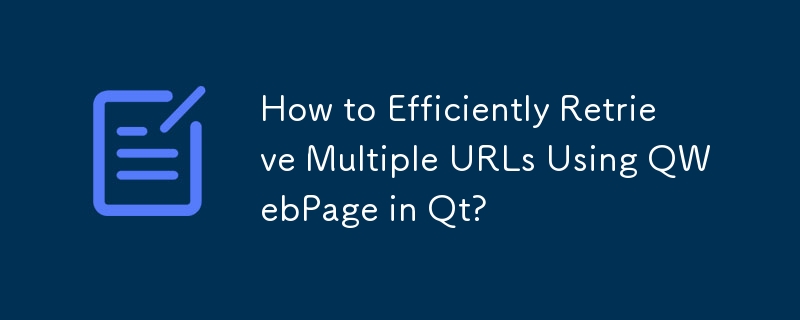
在此场景中,您尝试使用 Qt 的 QWebPage 来呈现动态更新的页面。但是,您在尝试渲染第二个页面时经常遇到崩溃。
问题分析
问题出在您的方法上。您正在为每个 URL 获取初始化一个新的 QApplication 和 QWebPage。相反,建议维护单个 QApplication 和 QWebPage,使用信号和自定义处理来处理同一实例中的多个 URL。
建议的解决方案
以下是 PyQt5 和 PyQt4 的自定义 WebPage 类:
PyQt5 WebPage
<code class="python">from PyQt5.QtCore import pyqtSignal, QUrl
from PyQt5.QtWidgets import QApplication
from PyQt5.QtWebEngineWidgets import QWebEnginePage
class WebPage(QWebEnginePage):
htmlReady = pyqtSignal(str, str)
def __init__(self, verbose=False):
super().__init__()
self._verbose = verbose
self.loadFinished.connect(self.handleLoadFinished)
def process(self, urls):
self._urls = iter(urls)
self.fetchNext()
def fetchNext(self):
try:
url = next(self._urls)
except StopIteration:
return False
else:
self.load(QUrl(url))
return True
def processCurrentPage(self, html):
self.htmlReady.emit(html, self.url().toString())
if not self self.fetchNext():
QApplication.instance().quit()
def handleLoadFinished(self):
self.toHtml(self.processCurrentPage)
def javaScriptConsoleMessage(self, *args, **kwargs):
if self._verbose:
super().javaScriptConsoleMessage(*args, **kwargs)</code>PyQt4 WebPage
<code class="python">from PyQt4.QtCore import pyqtSignal, QUrl
from PyQt4.QtGui import QApplication
from PyQt4.QtWebKit import QWebPage
class WebPage(QWebPage):
htmlReady = pyqtSignal(str, str)
def __init__(self, verbose=False):
super(WebPage, self).__init__()
self._verbose = verbose
self.mainFrame().loadFinished.connect(self.handleLoadFinished)
def process(self, urls):
self._urls = iter(urls)
self.fetchNext()
def fetchNext(self):
try:
url = next(self._urls)
except StopIteration:
return False
else:
self.mainFram().load(QUrl(url))
return True
def processCurrentPage(self):
self.htmlReady.emit(self.mainFrame().toHtml(), self.mainFrame().url().toString())
if not self.fetchNext():
QApplication.instance().quit()
def javaScripConsoleMessage(self ,* args, **kwargs):
if self._verbose:
super(WebPage, self).javaScriptConsoleMessage(*args, **kwargs)</code>以下是如何使用这些 WebPage 类的示例:
<code class="python">from PyQt5.QtCore import QUrl from PyQt5.QtWidgets import QApplication # PyQt5 url_list = ['https://example.com', 'https://example2.com'] app = QApplication(sys.argv) webpage = WebPage(verbose=True) webpage.htmlReady.connect(my_html_processor) webpage.process(url_list) sys.exit(app.exec_()) # PyQt4 from PyQt4.QtCore import QUrl from PyQt4.QtGui import QApplication url_list = ['https://example.com', 'https://example2.com'] app = QApplication(sys.argv) webpage = WebPage(verbose=True) webpage.htmlReady.connect(my_html_processor) webpage.process(url_list) sys.exit(app.exec_())</code>
在此代码中,my_html_processor 是一个可以自定义的函数,用于处理已处理的 HTML 和每个页面的 URL 信息。
通过实施此方法,您可以防止以前遇到的崩溃和随机行为,从而实现更稳定、更高效的网页抓取工作流程。
以上是如何在 Qt 中使用 QWebPage 高效检索多个 URL?的详细内容。更多信息请关注PHP中文网其他相关文章!




